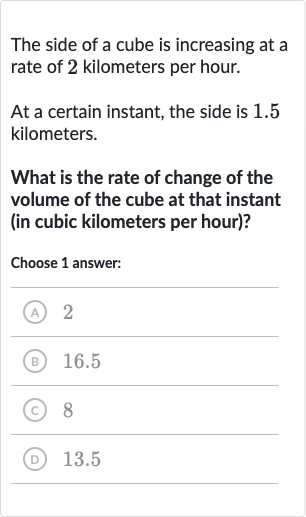AI tutor
Welcome to Bytelearn!
Let’s check out your problem:

The side of a cube is increasing at a rate of kilometers per hour.At a certain instant, the side is . kilometers.What is the rate of change of the volume of the cube at that instant (in cubic kilometers per hour)?Choose answer:(A) (B) (C) (D)
Full solution
Q. The side of a cube is increasing at a rate of kilometers per hour.At a certain instant, the side is . kilometers.What is the rate of change of the volume of the cube at that instant (in cubic kilometers per hour)?Choose answer:(A) (B) (C) (D)
- Volume Formula: The formula for the volume of a cube is , where is the length of a side.
- Rate of Change: To find the rate of change of the volume, we need to differentiate the volume with respect to time, so .
- Given Values: Given (rate of change of the side) is , and (side length) is .
- Plug in Values: Plug the values into the formula: .
- Calculate Rate: Calculate the rate of change of the volume: .
- Simplify Calculation: Simplify the calculation: .
- Finish Calculation: Finish the calculation:
More problems from Calculate unit rates with fractions
QuestionGet tutor help
QuestionGet tutor help
QuestionGet tutor help
QuestionGet tutor help
QuestionGet tutor help
QuestionGet tutor help
QuestionGet tutor help
QuestionGet tutor help
QuestionGet tutor help
